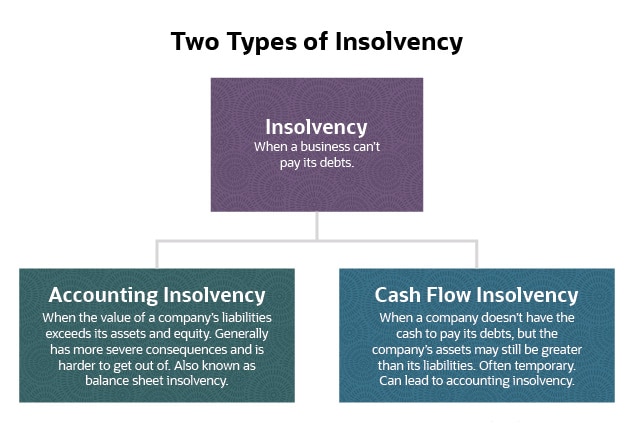Little Known Facts About Insolvency Practitioner.
Little Known Facts About Insolvency Practitioner.
Blog Article
The 5-Second Trick For Insolvency Practitioner
Table of ContentsThings about Insolvency PractitionerA Biased View of Insolvency PractitionerHow Insolvency Practitioner can Save You Time, Stress, and Money.The Greatest Guide To Insolvency PractitionerInsolvency Practitioner Can Be Fun For Anyone9 Simple Techniques For Insolvency PractitionerWhat Does Insolvency Practitioner Mean?
Insolvency is when obligations are more than the worth of the firm, or when a debtor can not pay the financial debts they owe. A company can become bankrupt as a result of a variety of circumstances that cause inadequate money circulation. When confronted with bankruptcy, a service or individual can contact creditors directly and restructure financial obligations to pay them off.Service owners may speak to financial institutions straight and restructure debts into more workable installations. Creditors are usually amenable to this strategy since they want to be paid back and prevent losses, also if the payment is on a delayed timetable.
Insolvency Practitioner - Truths
The owner creates a proposition outlining just how the financial obligation might be restructured making use of expense decreases or other strategies for support. The proposition shows financial institutions just how business might create enough capital for lucrative operations while paying its debts. Normally, a forgiven financial debt might be considered earnings by the Irs (IRS).

The Ultimate Guide To Insolvency Practitioner
The business might end up paying large quantities of cash in problems and be incapable to continue operations. When procedures stop, so does the business's income. Lack of income results in accounts payable and creditors requesting cash owed to them. Some business become bankrupt due to the fact that their goods or services do not progress to fit customers' changing requirements.
Expenditures exceed incomes and bills continue to be unsettled. Types of insolvency consist of cash-flow bankruptcy and balance-sheet insolvency. Cash-flow bankruptcy happens when a business has the possessions to cover their financial obligations but they remain in the wrong form, such as property rather than liquid funds. Balance-sheet insolvency, on the other hand, shows a lack of properties in any kind of type to cover financial debts.
The internal revenue service states that a person is bankrupt when the overall responsibilities exceed complete properties. A insolvency, on the other hand, is an actual court order that portrays exactly how a bankrupt individual or business will repay their lenders, or exactly how they will sell their assets in order to make the settlements.
The Best Strategy To Use For Insolvency Practitioner

Recognizing the elements that can cause bankruptcy, such as overspending, can assist you prevent insolvency and its repercussions.
Some Of Insolvency Practitioner
It is popular that supervisors and officers of companies (and supervisors of restricted liability companies) owe fiduciary obligations to their companies and their investors (or members). These fiduciary obligations are defined by state laws and, though there are variants from one state to another, they usually consist of a duty of loyalty and an obligation of care.
The duty of care needs supervisors and officers to exercise diligence, to make enlightened decisions, and to act in good faith to make sure that their activities remain in the very best rate of interest of the company. Beyond the range official source of this conversation, some states permit these obligations to be limited either by so noting in the organizational records or complying with other needs.
The Main Principles Of Insolvency Practitioner
The majority of states specify insolvency in 2 means( 1) when a business's liabilities come to be higher than the sum of its assets or (2) when the business ends up being not able to pay its financial obligations as they end up being dueand embrace both interpretations (Insolvency Practitioner). The change in duties occurs since when a business is bankrupt, there is no worth in the company beyond that owed to the company's creditors to make sure that the equity owners no more have an economic stake in the company
Be careful about offering investors advantageous therapy at the expense of lenders (e.g., authorizing and moneying a returns or a stock redemption). Take care concerning favoritism between classes of shareholders. Clear up initiatives to discover all the realities prior to taking a certain strategy; directors should genuinely believe that any type of decisions made remain in the most effective passions of the company in its entirety (i.e., decisions will be evaluated in knowledge because view it of the effect of such actions on the firm).
In any insolvency or bankruptcy proceeding, settlements made to specific lenders at the expenditure of other financial institutions can be clawed back, especially if there is some link in between the firm and the financial institution. Consider recommending at an annual investor conference (or any various other meeting of investors) a resolution attesting that all previous service choices and activities taken by the supervisors and officers of the company were taken in good belief after an exercise of sensible treatment.
Insolvency Practitioner Fundamentals Explained
Completely reveal any kind of personal or business partnerships with parties on the other side of purchases entailing the firm to prevent the appearance of a problem of passion. In assessing possible fund elevating purchases or a sale of properties of the distressed company, be aware helpful site that these deals might be looked at later in light of any kind of subsequent expansion of supervisors' fiduciary duties to consist of lenders.
Report this page